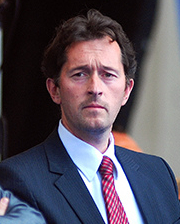Interview with Gregor Virant, Former Minister of Public Administration of Slovenia, WeBER Advisory Council Member

Gregor Virant, Former Minister of Public Administration of Slovenia, WeBER Advisory Council Member
During the accession process, WeBER can effectively complement the EU and particularly SIGMA work with a unique insight into the developments and improve public awareness of the importance of PAR. Also, it should to knock on the doors of the ministers and draw their attention to shortcomings. After the WB countries obtain membership in the EU and the external pressure and scrutiny over PAR will weaken, WeBER could become even more relevant as regards assessment of national public administrations.
Western Balkan countries appear to advance slowly towards the EU membership. What do you think are the main reasons for this? Do you believe this slow pace is a shared responsibility of the EU and the Western Balkans?
Yes, it is a shared responsibility. On one hand, there is still a lot of work for the WB countries to meet the standards for membership. On the other hand, the EU is overwhelmed with internal problems (illegal migration, the rise of populism, threats of trade wars) which has a demotivating effect to candidate countries and shifts the EU’s focus from enlargement to troublesome internal issues.
What are the biggest challenges for the Western Balkan countries in the public administration reform process and what are the common issues among the countries of the region?
The main challenge is the lack of political will and commitment. If the prime minister and ministers are interested in a particular area of public administration reform, things advance very fast. Look at the administrative services and e-government in Macedonia 5-10 years ago, or at the same area currently in Serbia. On the other hand, ministers in some countries are still not interested in having highly competent senior civil servants, they value loyalty higher. There is a serious lack of government strategic planning and evidence-based policymaking. The political commitment would help to set up the basics, all the rest is easier. If there is no political commitment, copy-pasting perfect legislative solutions or sophisticated methodologies is to no avail.
How can civil society efficiently “fight” for more participation in the policymaking and EU accession processes?
By exercising positive pressure, showing the governments the mirror image, reaching out to the media with critical observations and above all by raising awareness of the general public that the fate of their countries is in their hands and that they have the right to demand good governance.
Could you share with us your experiences with the public administration reform process in Slovenia? What were the biggest obstacles during the process of reforms and what can Western Balkan countries learn from Slovenia’s experience?
There’s a good practice in the recruitment of top-managerial civil servants where we have found a good combination of neutral assessment of competences on one hand and political discretion to enable “chemistry” between the ministers and their top-level team in the ministry. We have also established a good and sustainable system of filtering administrative burden as a part of impact assessment in the process of government decision making. We are also an example of how fast bureaucracy can rust if there is a lack of political commitment. In recent years things have deteriorated and people have noticed it.
In your view, what would be the greatest benefit of the WeBER project?
During the accession process, WeBER can effectively complement the EU and particularly SIGMA work with a unique insight into the developments and improve public awareness of the importance of PAR. Also, it should to knock on the doors of the ministers and draw their attention to shortcomings. After the WB countries obtain membership in the EU and the external pressure and scrutiny over PAR will weaken, WeBER could become even more relevant as regards assessment of national public administrations.
*This interview has been made as a part of the ninth issue of TEN Newsletter.

